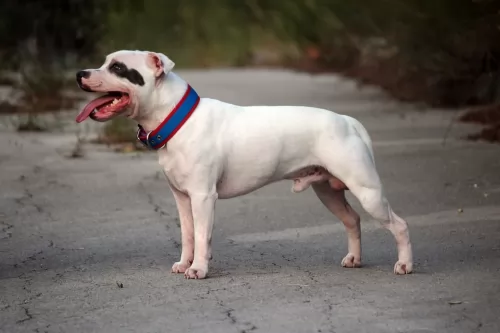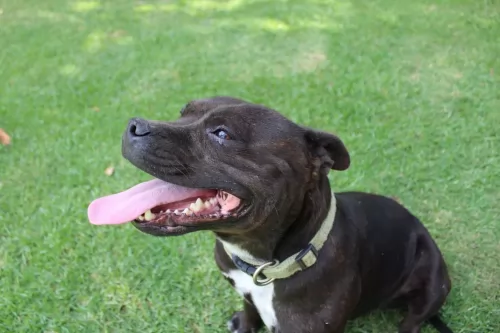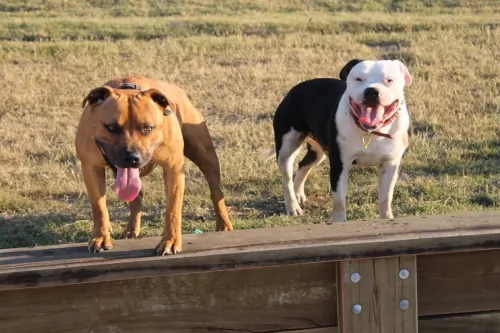 Petzlover
Petzlover Labrador Husky is originated from Canada but Staffordshire Bull Terrier is originated from United Kingdom. Labrador Husky may grow 30 cm / 12 inches higher than Staffordshire Bull Terrier. Labrador Husky may weigh 28 kg / 62 pounds more than Staffordshire Bull Terrier. Both Labrador Husky and Staffordshire Bull Terrier has almost same life span. Both Labrador Husky and Staffordshire Bull Terrier has almost same litter size. Labrador Husky requires Moderate Maintenance. But Staffordshire Bull Terrier requires Low Maintenance
Labrador Husky is originated from Canada but Staffordshire Bull Terrier is originated from United Kingdom. Labrador Husky may grow 30 cm / 12 inches higher than Staffordshire Bull Terrier. Labrador Husky may weigh 28 kg / 62 pounds more than Staffordshire Bull Terrier. Both Labrador Husky and Staffordshire Bull Terrier has almost same life span. Both Labrador Husky and Staffordshire Bull Terrier has almost same litter size. Labrador Husky requires Moderate Maintenance. But Staffordshire Bull Terrier requires Low Maintenance
 The Labrador Husky is a purebred, spitz-type dog which looks much like a Wolf. People think because it has the name Labrador Husky it is a cross between a Husky and Labrador. What it essentially means is that it is a Husky dog which comes from the region of Labrador, Canada.
The Labrador Husky is a purebred, spitz-type dog which looks much like a Wolf. People think because it has the name Labrador Husky it is a cross between a Husky and Labrador. What it essentially means is that it is a Husky dog which comes from the region of Labrador, Canada.
It is a fairly unknown breed, but it is strongly believed that the dog was developed in Labrador, a region of northern Canada. In fact this is where the dog got its name from.
The attractive dog was used for sledding and it is also thought that the people of Labrador introduced Alaskan Malamute and German Shepherd in to add in some additional skills from these two dog breeds. The dogs were later domesticated so as to become companion animals.
 The Staffordshire Bull Terrier was first developed in the northern sections of Birmingham and in Staffordshire, England. The Staffie is a cross between a Black and Tan Terrie and the Bulldog, but had other breeds crossed in over time in order to create a bull-baiting dog and a fighting dog. In the Victorian age these sports were banned but dog fighting went underground and continues on some level today.
The Staffordshire Bull Terrier was first developed in the northern sections of Birmingham and in Staffordshire, England. The Staffie is a cross between a Black and Tan Terrie and the Bulldog, but had other breeds crossed in over time in order to create a bull-baiting dog and a fighting dog. In the Victorian age these sports were banned but dog fighting went underground and continues on some level today.
The Staffordshire Bull Terrier was exceptional at these “sports” due to his build, power and jaw strength. Today’s Staffie is a descendent of those early Bull Terrier crosses. Together with the Bull Terrier and the American Pit Bull, the Staffie also traces its roots back to those original English Bully dogs. All three breeds have the Bulldog in common.
After dog fighting and bull baiting were banned the Stafforshire Bull Terrier was further developed as a companion and pet. Still their reputation as fighting dogs cost them recognition in the official kennel clubs for some time. They finally made the UK registry in 1935, but it was not until 1974 that the American Kennel Club (AKC) accepted them.
 The wolf-like muscular Labrador Husky is a large dog standing at 51 to 71 cm in height and weighing 27 to 45 kg.
The wolf-like muscular Labrador Husky is a large dog standing at 51 to 71 cm in height and weighing 27 to 45 kg.
Labrador is a place known for its icy winters and the dog’s double coat protects it from the freezing temperatures.
The color of the coat can be white, grey and white, solid black, solid grey as well as red and white. In fact there can be several different coat colors in one litter.
He has a long muzzle like the wolf and blue or brown slanted eyes. Sometimes you’ll get one blue eye and one brown eye. He has pointed ears, a nose which can be black or a pinkish color, bushy tail and paws which are webbed.
Labrador Huskies make wonderful pets and they are good with children, particularly when they’ve been properly trained and socialized.
Because they are dogs which have worked in a pack, they also get on well with other dogs in the home. You’ll notice that your Labrador Husky won’t often bark but he will howl like a wolf.
He is a friendly dog and not aggressive. He is intelligent too and you can teach him some basic commands such as sit, stay and lie-down.
The Labrador Husky is a dog used to having a job so if you bring him into your home, you’ll need to ensure that you set aside time to exercise him as he will become frustrated and bored if he isn’t involved in your family life.
 The Staffordshire is a muscular, stocky and unusually strong breed, small to medium size in height and build. They have broad, powerful chests, wide set, strong legs, strong shoulders, broad head with a fairly short muzzle. Their ears are not cropped but they are short and fold over. The coat is stiff, close and short and the tail is medium and carried low. Most Staffies are brown, but they can be red, brindle with white, fawn, black, white or blue.
The Staffordshire is a muscular, stocky and unusually strong breed, small to medium size in height and build. They have broad, powerful chests, wide set, strong legs, strong shoulders, broad head with a fairly short muzzle. Their ears are not cropped but they are short and fold over. The coat is stiff, close and short and the tail is medium and carried low. Most Staffies are brown, but they can be red, brindle with white, fawn, black, white or blue.
 A Labrador Husky is a loyal, affectionate dog who is capable of forming a strong bond with his human family.
A Labrador Husky is a loyal, affectionate dog who is capable of forming a strong bond with his human family.
As a working dog, he loves being busy with fun and games and is playful and energetic and has good looks on his side too.
He is also an intelligent dog, strong-willed and confident and will require a firm, consistent owner who understands his need for regular exercise.
Social, lively and robust, the right environment will bring out all this beautiful dog’s best characteristics.
 1.Children friendliness The breed adores children but care should still be taken because they are so strong and their jaws are so powerful.
1.Children friendliness The breed adores children but care should still be taken because they are so strong and their jaws are so powerful.
2.Special talents they adore children and they one of the most powerful jaws among canines.
 Labrador Huskies can live to be between 10 and 13 years of age, and within a loving home he is generally looked upon as a healthy breed.
Labrador Huskies can live to be between 10 and 13 years of age, and within a loving home he is generally looked upon as a healthy breed.
There are always typical dog problems that might be found in your dog, and a couple of the more prominent ones are listed -
It can be a sad day for your Labrador Husky if he is diagnosed with hip dysplasia because if he is still used as a pack dog for pulling sleds it could well put him out of a job that he thrives on. It is a problem in the hips, and your once active dog may be in pain and may even battle to stand up after lying down.
He could even develop arthritis which can cripple him. He’ll need to get to the vet so that treatment can make life comfortable for him and to assist with pain.
Deep chested dogs are more prone to bloat, and your Labrador Husky is a deep chested dog. The stomach of the dog expands with gas, blocking gas escaping and putting pressure on the abdominal organs of the dog.
In some cases the stomach can twist and then immediate surgery will be required. This is a life threatening illness. Try and avoid feeding your dog one large meal and feed him smaller meals instead. These days you also get feeding bowls that encourage slower eating.
 • Patella luxation otherwise known as a slipped kneecap- can cause pain and some lameness.
• Patella luxation otherwise known as a slipped kneecap- can cause pain and some lameness.
• Skin allergies and even a tendency toward Mange which is chronic in some forms and fatal in others.
• Like most active dogs their size, they are susceptible to bloat which can be fatal if not treated immediately.
 You’ll want to introduce a proper grooming routine for your pet as he has a thick double coat and he sheds throughout the year. Brush the thick coat 2 or 3 times a week, and set aside time to check for fleas and ticks and any appearance of lumps.
You’ll want to introduce a proper grooming routine for your pet as he has a thick double coat and he sheds throughout the year. Brush the thick coat 2 or 3 times a week, and set aside time to check for fleas and ticks and any appearance of lumps.
These are dogs which require a lot of vigorous exercise. Left chained or ignored he can become frustrated, run-down, bored and sick. He is a living, social animal that should only be brought into a household that acts responsibly towards him.
Choose high quality food which is for high energy dogs. If you give him dry kibble, mix in some home-made food occasionally to add variety, and also try to include some raw meat from time to time. Always ensure fresh, cool water is available.
 1.Feeding the puppy Don’t over feed as he grows fast. Feed a high quality dog food for medium size puppies. Feed 1-2 and a quarter cups in 3-4 meals per day.
1.Feeding the puppy Don’t over feed as he grows fast. Feed a high quality dog food for medium size puppies. Feed 1-2 and a quarter cups in 3-4 meals per day.
2.Feeding the adult Don’t exercise right before or after eating due to potential for bloat. Feed 1-2 times a day a high quality medium breed dog food.
4. Games and Exercises They are terriers after all and they dig. Need a fairly large yard with a strong fence. They love to play ball, frisbee and can excel at cart pulling.